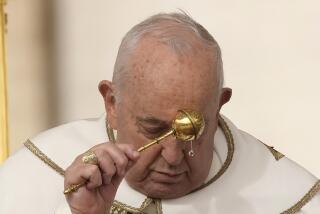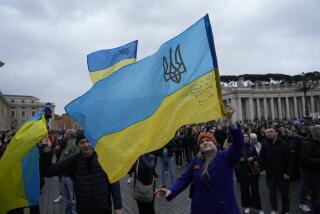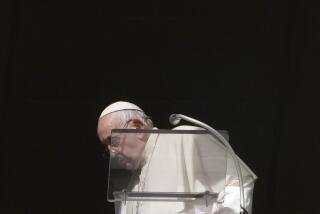Frail Pontiff Urges Croats to Forge Peace
ZAGREB, Croatia — He came at last to the tortured Balkans as a “defenseless pilgrim,” looking frail and unsteady but sounding resolute. Pope John Paul II on Saturday admonished the welcoming faithful of a Catholic country that it is their “sacred duty” to forge peace in a land riven by ethnic warfare.
John Paul’s first visit to a piece of the former Yugoslav federation was marked by unflagging spirit but physical discomfort: For the first time in 62 foreign trips, the 74-year-old pontiff failed to directly kiss the ground of a new country.
The Pope, who broke his hip in April, maneuvered with difficulty and uncertain balance when he arrived in this Croatian capital.
With fierce concentration, he descended the 19 red-carpeted steps from his plane slowly, one hand on a thin black cane, the other clutching the gangway banister.
Aides sprang to help him with the last two steps. With the Pope clearly unable to kneel, the ground-kissing ceremony was finessed when two welcoming Croats came forward with a bowl of earth. John Paul bowed and brushed the warm soil softly with his lips.
Croatia’s history is steeped in Catholicism--3.7 million of the country’s 5.5 million people are members of the faith, by Vatican count--and the Pope received a thunderous welcome.
Gigantic crowds lined fields of fresh-harvested corn near the airport and Zagreb’s pleasant, tree-shaded streets, cheering the Pope as he rode his Popemobile to the cathedral that has been the religious heart of the capital since the 13th Century.
After a long, elaborate vespers service, John Paul seemed drained. Vatican aides clustered protectively around him as he shuffled from the church.
Peace in the Balkans has become an abiding priority for the Pope. He had envisioned the Croatia visit as one of three to pieces of a Yugoslav federation that was splintered after the fall of communism.
But the Serbian government in Belgrade and the Serbian Orthodox Church, which believe that the Vatican sides with Catholic Croatia, said the pontiff would not be welcome there. A papal visit scheduled for last Thursday to the besieged Bosnian capital, Sarajevo, was canceled at the last minute for security reasons.
At the airport, John Paul proclaimed himself “a defenseless pilgrim of the Gospel of Jesus, which proclaims love, harmony and peace.” The message has not been embraced in the Balkans. Croatia sent two warplanes to escort the pontiff’s jet, and reporters making the trip were immediately given a 121-page book chronicling the Serbian destruction of churches in Croatia and neighboring Bosnia-Herzegovina.
In a strongly nationalist welcoming address, Croatian President Franjo Tudjman applauded the Pope as a friend--and ally--of an independent, Catholic Croatia in the face of Serbian aggression.
John Paul, though, tried to remain nonpartisan, railing against “bloody fratricidal war” that has too long savaged a land “whose people for centuries were used to reciprocal tolerance and exemplary collaboration.”
With scant prospects for peace, war has shifted from Serb-Croat struggles in Croatia to three-sided slaughter in Bosnia-Herzegovina, the Pope said.
“How much innocent blood has flowed, how many tears have streaked the faces of mothers, children, young men and elderly people?” he lamented in a Croatian-language address broadcast live from the airport.
“The Holy See is continuing to adopt every means available to overcome the existing tensions and toward the re-establishment of justice and peace in the Balkans. However difficult, the peace effort is a sacred duty for every believer.
“Peace, if it is really desired, is always possible! To construct peace on the basis of justice and truth, we must first pray to God,” John Paul said.
In a region where peacemakers have been more frustrated than blessed, John Paul begged Croats to promote a tolerant “culture of peace.”
“Such a culture does not reject a healthy patriotism, but this is far from the exasperations of exclusive nationalism. . . . Wounds produced by hatred will not be healed by rancor, but rather by the therapy of patience and the balm of forgiveness,” the Pope said.
At the cathedral, John Paul told Croatian priests and nuns that it is their “great and serious task . . . to reconcile men with God and among themselves.”
The Pope lavished praise on the late Cardinal Aloysius Stepinac, leader of Croatian Catholics during World War II and a symbol of unslaked hostility between Croats and Serbs.
Croats cherish Stepinac as a patriot, and, to repeated applause from the congregation, the Pope lauded him in the cathedral where he is buried as “a true man of the church, ready for extreme sacrifice not to deny the faith.”
Serbs revile Stepinac, saying he and his priests condoned the massacre of tens of thousands of Serbs by Croatian Fascists allied with Nazi occupiers during the war.
Organizers of the papal visit say they expect as many as half a million Catholics at a Mass this morning at Zagreb’s racetrack after John Paul pays a courtesy call on Tudjman.
The Pope returns to Rome tonight, concluding his first foreign trip since a visit to the three Baltic republics a year ago. A spring visit to Lebanon was canceled because of possible violence, and a trip to Belgium was canceled because of the broken hip.
As he completes the 16th year of his reign, the world’s most traveled Pope has one more 1994 trip scheduled: to the United Nations in New York next month, with brief side visits to Newark, N.J., and Baltimore.
More to Read
Sign up for Essential California
The most important California stories and recommendations in your inbox every morning.
You may occasionally receive promotional content from the Los Angeles Times.










